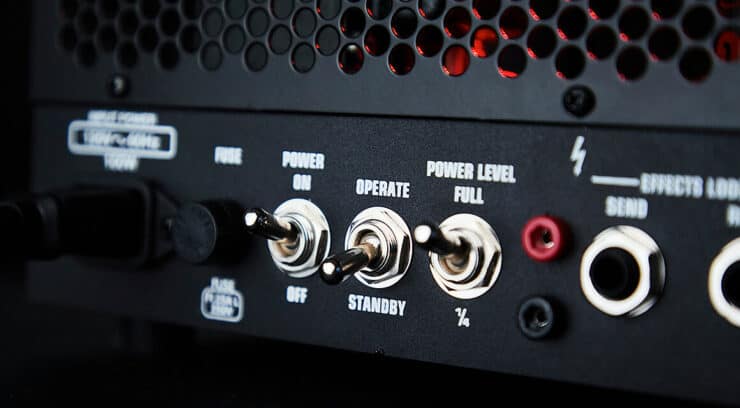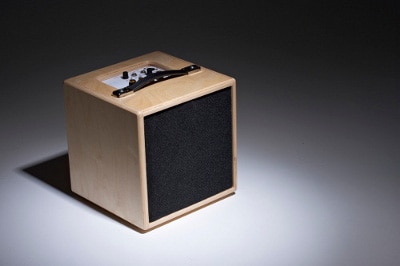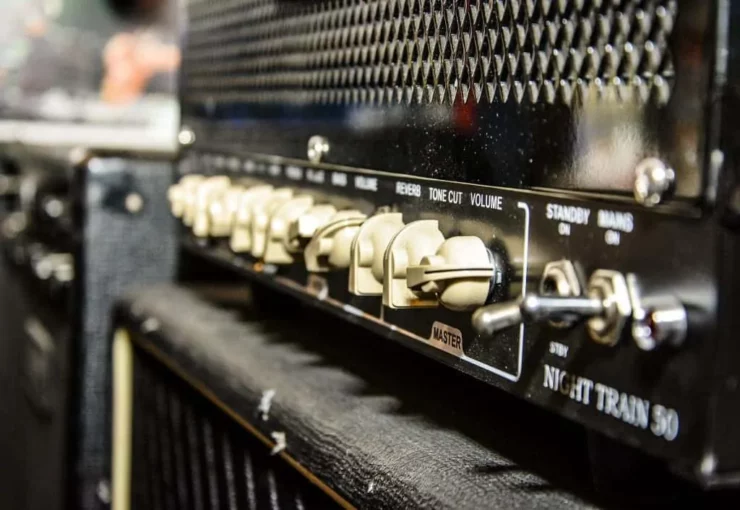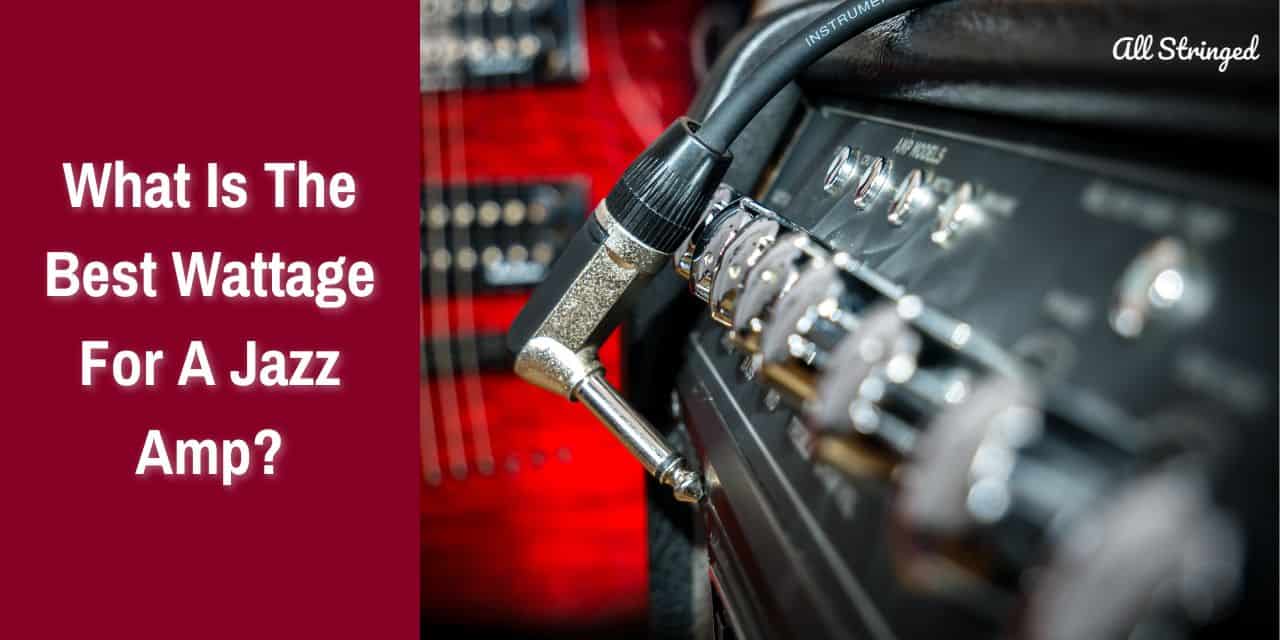Are you looking for the perfect amp to give your jazz guitar playing the sound you’ve been searching for? The right wattage can make a world of difference in your tone, so it’s important to find the right amp for your needs. In this article, we’ll discuss the best wattage for a jazz amp so you can find the best sound for your style. Read on to get all the details and find the perfect amp for your jazz guitar playing!
What is wattage for jazz amps?
Jazz music is a genre that demands finesse, clarity, and subtlety in its sound. Jazz guitarists rely on their amps to translate the intricate nuances of their playing into a melodic tapestry that captivates audiences. An important factor in choosing the right amp for jazz is wattage.
Wattage refers to the amount of power an amp can deliver to produce sound. In simple terms, it measures the loudness and volume capabilities of the amp. In Jazz amps, wattage plays a pivotal role in shaping the sound, responsiveness, and overall performance of the amp.
For jazz musicians and guitarists, the dynamics of their sound are of paramount importance. In intricate fingerpicking, delicate chord progressions, and expressive solos demand an amp that can reproduce every subtlety.
>>> Click here to read our review about the Top 15 Best Jazz Amps <<<
Choosing the appropriate wattage for a jazz amp will depend on various factors, including the playing environment, ensemble size, and personal preferences. Smaller venues may require lower wattage amps to maintain clarity at lower volumes. Meanwhile, larger venues can benefit from higher wattage options for projection and headroom.
How does wattage affect the sound in jazz amps?
Jazz is a genre celebrated for its intricate melodies and subtle nuances as it places unique demands on its amplification. The choice of amp wattage plays a key role in shaping the sound of jazz music. From the chord voicings to the expressive solos, wattage affects how these sonic elements are reproduced and perceived. Here are the different ways wattage affects sound in jazz amps.

Clean headroom and dynamics
One of the important aspects of jazz guitar sound is clean headroom. This is the ability of an amp to maintain clarity and definition even at higher volumes. In jazz, where the music often needs a clean and articulate tone, an amp with sufficient wattage will ensure that the sound remains clear and undistorted. Higher wattage amps offer more headroom, allowing jazz guitarists to play dynamically without the fear of unintentional saturation.
Clarity and detailed sound
Jazz guitarists thrive on the subtleties of their playing, with each note contributing to the intricate fabric of the piece. Amp wattage influences the level of detail and articulation that can be achieved. Higher-wattage amps tend to have better transient responses, capturing the nuances of attack and decay in each note. This results in a much more defined and articulate sound, which is important for rendering complex chord voicings and melodic runs characteristic of jazz.
Tone warmth and compression
Amps with lower wattage often exhibit a touch of natural compression when pushed. This compression can result in a warm and smooth quality to the sound, enhancing the sustain and adding a touch of vintage character. Jazz guitarists often appreciate this tonal characteristic as it can contribute to the rich textures and sustain that are important to the genre.
Interaction with tubes and circuitry
The components with an amp, including tubes and circuitry, interact differently at various wattage levels. Lower-wattage amps might exhibit more noticeable tube saturation and harmonic distortion, which can add warmth and character to the sound.
Meanwhile, higher-wattage amps can emphasize the pristine clarity of solid-state components. Jazz guitarists should consider their preference for tube-driven warmth or solid-state precision when choosing amp wattage.
Performance settings and flexibility
Jazz performances can range from intimate club settings to larger concert halls. The wattage of an amp can determine its suitability for different environments. Smaller venues will require lower wattage amps for achieving optimal sound quality at lower volumes whereas larger venues will require higher wattage options for ideal projection and headroom.
What is the best wattage for a jazz amp?
Selecting the ideal wattage for a jazz amp is an important decision that can greatly influence the sound and performance of a jazz guitarist. If you’re looking to find out what is the best wattage for a jazz amp, then you’re going to come up short as there isn’t a one-size-fits-all answer. To find out what is the best wattage for a jazz amp, it’ll require you to consider factors like playing style, venue size, performance settings, tonal preferences, and more.
For most jazz guitarists, a wattage range of 15 to 40 watts will strike the balance between clean headroom and tonal intricacies. A range of 15-30W will be enough to provide a full-bodied tone without becoming too loud. Meanwhile, if you’re looking to power an amp for larger venues, the ideal wattage would be somewhere between 40W and 60W. Here is how you can find out what is the best wattage for a jazz amp such as –
#1. Playing style and musical nuances
Jazz guitarists are known for their delicate chord voicings, intricate fingerpicking, and expressive solos. A wattage that offers clean headroom, allowing for clarity even at higher wattages, is important. Typically, jazz guitarists prefer amps with wattages ranging from 15 to 30 watts, which strike the perfect balance between volume and tonal intricacies. This allows for the nuances of the playing style to be captured without distortion.

#2. Performance settings and venue size
The venues in which jazz guitarists perform greatly influence the choice of wattage. Smaller venues, such as intimate jazz clubs, might require lower wattage amps to maintain tone quality at lower volumes.
In contrast, larger venues and outdoor stages might demand higher wattage amps for projection and headroom. You should consider the type of venues you frequent and ensure your chosen wattage aligns with the needs of your performances.
#3. Volume flexibility and dynamics
Jazz music often requires a dynamic range that spans from whisper-quiet passages to soaring crescendos. The wattage of an amp affects how it responds to these dynamic shifts. Higher wattage amps offer greater headroom and flexibility in achieving a wide dynamic range, allowing for expressive playing without unintended distortion. However, lower wattage amps can exhibit natural compression when pushed, contributing to a warm and vintage-inspired tone.
#4. Tone preferences and aesthetic
The choice of wattage can align with personal tonal preferences. Lower wattage amps tend to exhibit more noticeable tube saturation, offering a warm and inviting tonal character. This can enhance the sustain and add depth to the sound, attributes that many jazz musicians and guitarists value. Conversely, higher wattage amps lean towards cleaner tones, showcasing the clarity of solid-state components.
#5. Interplay with pedals and effects
Jazz guitarists often incorporate effects pedals into their setups for shaping their sound. Amplifier wattage impacts how pedals interact with the amp’s preamp and power amp sections. Higher wattage amps tend to respond more dynamically to pedals, allowing for nuanced control over the effects. Lower wattage amps can provide a unique interaction with pedals, adding a touch of compression and warmth.
#6. Clean headroom
Clean headroom refers to an amp’s ability to stay clear and undistorted at higher volumes. Jazz often involves clean and clear tones so having ample clean headroom is important to avoid unwanted break or distortion. A higher-wattage amp offers more headroom, allowing you to maintain a pristine sound even when playing at higher volumes.
#7. Band dynamics
You should consider the ensemble you will be performing with. If you are part of a larger jazz band with multiple instruments, including bass, drums, and horn sections, a higher wattage amp may be needed to ensure your guitar or instrument cuts through the mix effectively.
#8. Amp type and efficiency
The efficiency of the guitar amp’s design also impacts the required wattage. Tube amps often produce more perceived volume for a given wattage compared to solid-state amps due to their unique characteristics. Digital modeling amps might have different wattage requirements based on their design and technology.
#9. Trial and adjust
Ultimately, the best way to determine what is the best wattage for a jazz amp is through trial and error. Experiment with different amp wattages in different settings, adjusting as needed based on your experiences. You should consider borrowing or renting different amps to test their suitability for different venues and situations.
What is the ideal wattage for different types of jazz amps?
Jazz is a genre that requires amplification that complements its subtleties. There are different types of jazz amps that offer distinct tonal profiles. Choosing the right amp is an important step in shaping the perfect jazz tone. With a plethora of options available, understanding the characteristics of different types of jazz amps is important for crafting a sound that captures the subtleties of the genre. Each type of amp has specific wattage needs for different types of jazz amps. Here are the different types of amps for jazz amps and the ideal wattages for them.
Tube combo amps
Tube combo amps are known for their rich, warm, and inherently expressive tones that define their classic sound. These guitar amps often produce natural tube saturation and compression when pushed, contributing to a harmonically rich sound that resonates with jazz music’s subtleties.
Jazz musicians and guitarists appreciate the natural compression and responsiveness of tube amps, which makes them ideal for achieving the clean, nuanced tones required in jazz music. The lower wattages of tube combo amps are often preferred for smaller venues and studio work.
For smaller venues and intimate settings, a wattage ranging from 15 to 30 Watts is commonly favored. They offer the perfect balance between tonal intricacies and volume headroom while allowing for controlled tube overdrive at manageable volumes. Their smooth breakup and harmonic richness make them a particular favorite among jazz purists looking for vintage-inspired warmth.
Solid-state combo amps
Solid-state combo amps make use of transistors and digital circuitry for amplification to deliver a reliable, precise, lightweight, and cost-effective option. They offer clear, precise tones with minimal distortion and a clear tonal palette, making them ideal for modern jazz players who value clarity and versatility. With these amps, you can expect a transparent sound with minimal coloration. They’re often chosen for their reliability and ability to maintain consistent performance even at higher volumes.
These guitar amps are able to handle higher wattages without succumbing to tube saturation or distortion, making them ideal for larger venues. Jazz musicians and guitarists looking for a clean and transparent sound with minimal coloration often go for solid-state combo amps with wattages of around 40 to 60 watts. This wattage range ensures clean headroom while accommodating volume demands in larger venues, excelling in delivering articulate and pristine tones.
Tube stack amps
Tube stack amps or also known as “amp heads” combined with separate speaker cabinets offer the power and versatility needed for larger jazz ensembles and performances. These amps command attention with their imposing presence, consisting of multiple speaker cabinets and powerful amplification. The separate components allow for customization, allowing jazz musicians and guitarists to pair different types of speaker cabinets for specific tonal qualities.
These amps exude power and elegance, making them a heavily favored option for jazz guitarists with a penchant for larger performances. They’re able to project sound across expansive venues while preserving the warm and dynamic tube-driven tones.
Stack amps, with their multiple speaker cabinets, deliver ample projection and headroom. Jazz guitarists playing in outdoor venues or big bands should lean towards wattages exceeding 50 watts. The higher wattage will allow for authoritative projection and clear articulation, even in expansive settings. They also offer the flexibility to dial in a wide variety of tones while commanding the stage with a commanding presence.
Modeling amps
Modeling amps are a modern innovation that offers a digital approach to amp emulation, catering to jazz guitarists who are on the lookout for a wide range of tones. These amps make use of digital technology for replicating the sounds of various amplifier types and effects. These amps provide a wide array of sound options, making them extremely versatile tools for jazz musicians and guitarists looking for flexibility in their tone palette.
This way, the musicians and guitarists are able to switch between different amp models and effects presets. Modeling amps are extremely versatile and convenient, which makes them suitable for jazz musicians who want to explore a wide range of tonal possibilities, from classic to contemporary. These amps often include power scaling features that allow musicians and guitarists to adjust wattage to their needs, catering to different performance scenarios.
For jazz clubs and studio work, a wattage range of 15 to 30 watts is more than sufficient. Meanwhile, for larger venues or more experimental performances, the wattages can be scaled up to meet the demands of the environment.

Boutique amplifiers
Boutique amps are artisanal creations that are crafted by skilled experts who prioritize quality and uniqueness. They’re handcrafted and tailored to individual preferences as they come in different wattages to suit specific tonal desires. These amps combine the best attributes of classic and modern amplification.
These amps are often handmade, using carefully selected components for achieving exceptional sound quality and aesthetics. They cater to discerning jazz musicians who are seeking a personalized and distinct sound that reflects their individual style and preferences.
These amps can be found across various wattage ranges. Jazz musicians and guitarists who are looking for a unique and personalized sound can opt for boutique amps with wattages ranging from 20 to 40 watts. The amps are designed to capture the essence of classic tube tones while delivering modern flexibility and responsiveness. They offer a blend of vintage warmth, modern features, and artisan craftsmanship that resonates with jazz musicians and guitarists looking for a distinctive sound.
Factors to consider when choosing a jazz amp
Selecting the ideal jazz amp is a nuanced journey that will require careful consideration of different factors. Jazz music demands a distinct tonal palette that captures its subtleties and nuances, with each factor contributing to the harmonically rich and expressive sound. Here are some of the key factors that jazz guitarists must consider when choosing a jazz amp, ensuring they’re able to find the equipment that aligns with their vision.
Speaker size
The speaker size of the amp plays a pivotal role in shaping its sonic character. For jazz guitarists looking for clarity and warmth, a larger speaker size such as 12 to 15 inches is often preferred. Larger speakers deliver a full-bodied sound that enhances the richness of jazz chords and melodies. They offer ample low-end response and smooth highs, which are important for articulating the complexities of jazz guitar playing.
Tone controls
Tone controls are important for shaping the tonal characteristics of your amp. Jazz guitarists often seek jazz amps with versatile EQ controls that allow precise adjustments. You should look for amps with independent bass, midrange, and treble controls.
Additionally, some jazz amps feature a mid-scoop feature that accentuates the frequencies typically associate with jazz guitar tones. Having control over the frequency range will empower you to sculpt your desired sound with precision.
Effects
While jazz tends to lean towards a clean and unadorned sound, some effects can enhance the ambiance and creativity of your playing. Reverb is an extremely popular choice among jazz guitarists, adding a touch of depth and spaciousness to the sound. A quality onboard reverb can offer a lush ambiance that complements the smooth and intricate nature of jazz music.
Connectivity
The ability to connect your amp to different sources and devices adds versatility to your playing options. Look for amps with multiple input channels, including instrument and microphone inputs for accommodating various performance scenarios. Additionally, having an effects loop allows for integration with external effects pedals, further expanding your tonal possibilities.
Power options
The power output of a jazz amp determines its suitability for different performance settings. For smaller venues and studio work, lower wattage amps in the range of 15-30W can provide sufficient volume and headroom. However, larger venues or outdoor performances might necessitate higher wattage amps to ensure projection and clarity.
Portability and size
Consider the practicality of transporting your jazz amp. Smaller combo amps are often preferred by guitarists for their portability and convenience, making them perfect for gigs in intimate jazz clubs or studio sessions. Stack amps may offer more power and projection but they can be bulkier and less practical for frequent transportation.
FAQs
What is the difference between wattage and power in an amplifier?
Wattage is the measure of power in an amplifier and is typically used to indicate the maximum power the amplifier can deliver. Power, on the other hand, is the amount of power actually produced by the amplifier, which can vary depending on the settings.
What wattage should I look for when choosing a jazz amp?
For jazz amps, it is generally recommended to look for an amp with a wattage of 15-30 watts. This is enough power to provide a full-bodied tone without becoming too loud or distorted. If you need more power for larger venues, you can look for an amp with a higher wattage, such as 40-60 watts.
What other factors should I consider when choosing a jazz amp?
When choosing a jazz amp, it is important to consider the size and weight, tone control, available effects, and price. You should also consider the type of speaker and the type of tone you are looking for. The best way to find the right amp for your needs is to try out different models and find the one that best suits your playing style.



